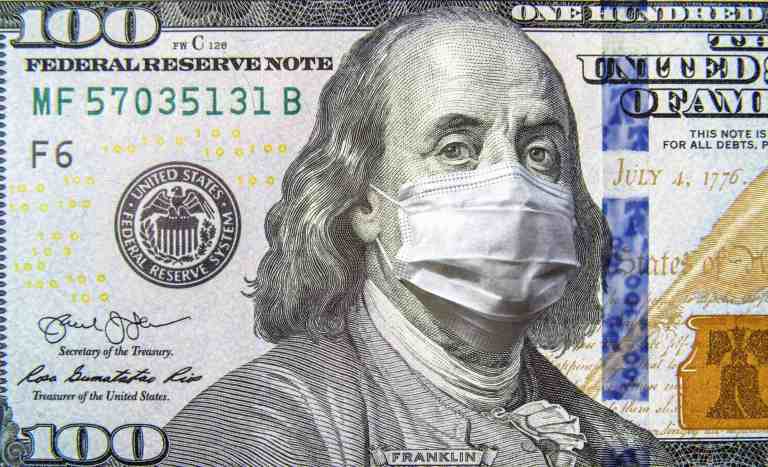Messy rollout of COVID-19 relief money continues

A few minutes every morning is all you need.
Stay up to date on the world's Headlines and Human Stories. It's fun, it's factual, it's fluff-free.
In the weeks following passage of the United States’ COVID-19 economic relief package, known as the CARES Act, millions of Americans have started to receive checks from the federal government.
The law states that Americans who earn less than US$75,000 per year are eligible to receive a one-time payment of US$1,200 – US$2,400 for a couple – with an extra US$500 for each child they claim as a dependent.
For small businesses, under a scheme known as the “Paycheck Protection Program,” up to 8 weeks of payroll costs can be covered, including worker benefits.
Up to US$10,000 in emergency loan money is also available for eligible businesses. In addition to these payments, monthly US unemployment benefits were increased by up to US$600 per week.
According to the US government, the act is meant to provide “fast and direct economic assistance for American workers, families, and small businesses, and preserve jobs for our American industries.”
Most recent jobs numbers from the US Department of Labor indicate that by the end of April 20.5 million jobs have been lost, raising the US unemployment rate to 14.7 percent, the worst since the Great Depression.
Many still waiting
While many Americans have received their stimulus checks, reports indicate that the rollout of the project hasn’t been as smooth as intended. For individuals, the checks have gone out in phases, meaning that while some have already received their checks, others are still waiting.
The IRS created a website dedicated to the relief payments in an effort to streamline the process. The agency has publicly urged citizens who haven’t yet received a check to input their information.
Some estimates indicate that it will take the federal government 20 weeks to get all of the payments out. While the IRS does have a percentage of Americans’ bank account information on file from recent tax filings, for countless other individuals that information could be incorrect, outdated or nonexistent.
In 2017, a government report indicated that 6.5 percent of Americans were unbanked, which means they did not have a bank account. Residents of these 8.4 million households can only receive their relief money if it is mailed to them.
In the meantime, many Americans are struggling.
“People have normal problems, and you pile this on top, it’s a recipe for disaster," said Catherine Escalera, a former nail technician from Long Island, New York. “Financially, people who are already teetering on the edge, you’re pushing them right over."
Incorrect payments
In some cases, a lack of updated information has led to some unusual checks being sent out.
Several weeks ago reports surfaced that a British woman who had temporarily worked in the US had received a payment.
Ryan Scribner, an American business owner, spoke with The Millennial Source to recount how the IRS sent his girlfriend’s deceased grandmother a check, even though the government apparently knew that she had already passed away.
“My girlfriend’s grandmother passed away in 2018. Much to her surprise, her grandmother received a stimulus check in the mail! Not only that, right on the check it listed her name followed by the word deceased,” he said. “We [are holding] onto the check until we get further instructions. We won’t be cashing it unless we are instructed to do so.”
Some observers have suggested that the task of sending out checks to millions of Americans on such short notice is not a straightforward process, and the IRS has urged citizens to be patient.
Misguided priorities?

Reports have surfaced that some small businesses have yet to receive their aid money as well.
According to Hannibal Ware, the Inspector General at the US Small Business Administration, disadvantaged populations and rural businesses have not been prioritized in the payment rollout.
“Because SBA [the Small Business Administration] did not provide guidance to lenders about prioritizing borrowers in underserved and rural markets, these borrowers, including rural, minority and women-owned businesses may not have received the loans as intended,” he wrote to the SBA on May 8.
Ware recommended that the SBA revise the borrower application to include optional demographic information to help the agency better reach these populations. Others have criticized the CARES Act for including retroactive tax cuts for large corporations, claiming that the money would be better directed to bolstering payments to struggling individuals and small businesses.
New proposal
In response to calls that the government needs to do more to help regular citizens affected by the COVID-19 crisis, Senators Kamala Harris, Bernie Sanders and Ed Markey have proposed a new bill that would send a monthly US$2,000 check to every American who makes under $120,000 annually.
Under the proposal, the payments would continue until three months after the public health emergency provision has been lifted.
For now, it is unclear how much support the bill has among the broader legislature.
In April, Senate Majority Leader Mitch McConnell called for a pause on any new aid, but has since suggested that he is open to more funding for state and local governments.
Have a tip or story? Get in touch with our reporters here!




Comments ()